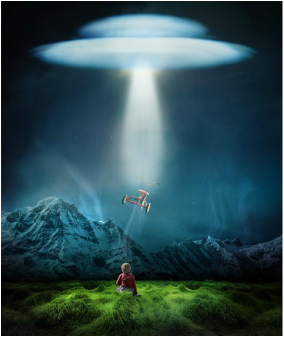 The REAL question here is, how was the kid riding a tricycle on that kind of terrain?
The REAL question here is, how was the kid riding a tricycle on that kind of terrain? Whether your story element is a character with superpowers, a high-tech sci-fi gadget, or a bizarre space phenomenon, there's one dilemma that always arises when your story includes something beyond what science can currently explain:
Do you offer a scientific-sounding explanation, knowing that you're going to get the crap debunked out of you if you don't research the matter thoroughly enough, or if future scientific discoveries counter your explanations for currently impossible technology?
Do you give a half-assed explanation that you KNOW is already pretty much debunked, like "radiation creates superpowers" or "genes let you control the weather"?
Or do you just include the element, forego specific explanations, and hope nobody asks too many questions?
I've seen examples across the spectrum, from stuff like Mass Effect that sounds plausible to a layperson like me, to the technobabble in Star Trek that sometimes induces face-palming in even the moderately knowledgeable, to superhero stories' obviously bogus belief that genes and radiation can do anything the plot demands.
Some stories, like Farscape, choose to avoid explaining technology for which science currently has no explanation, thereby escaping a descent into meaningless technobabble and inevitable scientific debunking.
And me?
I've struggled with that question several times lately.
Aliens and catgirls and superpowers, oh my!
I ended up going with the second option. The way his tech worked wasn't important to the story, and I'm not mechanically savvy enough or interested enough in machines to go into the nitty-gritty details of how his gear operated.
Heaven help me if I ever write a story where the mechanical operations of a spaceship become important to the plot.
I also encountered the Explanation Dilemma when I was writing Catgirl Roommate. Why does Nyla exist? How did a human-shaped person come to have the ears, tail and mindset of a cat?
And is there any explanation for such a being that wouldn't be total and obvious BS?
Once again, I ended up just letting the story element be what it is, without stretching the bounds of scientific plausibility any further than I already had. Explanations were unnecessary, and even if I did come up with one, it would probably be darker than the tone I was going for.
Is foregoing explanations going to be an ongoing pattern in my novels?
In one of the books I'm currently planning, there will be an organization of modified supersoldiers, and I do plan to explore the details of how the modifications work and how the altered warriors use their newly enhanced abilities.
Why?
Because it's important to the plot. One of the main characters is a medic, and she's had to learn her modifications inside and out in order to use them to their highest potential.
In this book, the logistical details of my fictional science will be relevant to fight scenes, medical crises, and the slow descent into madness that these characters inevitably face as the price for their heightened power.
And that, I believe, is a useful guiding star when it comes to deciding what, if any, details to include when explaining the unexplainable or hard to explain.
If it's important, I'll do my best to explain it. But if it isn't, there's no need to go on a tangent about something that's only marginally relevant to the plot.
What's your opinion on scientific explanations in fiction?
Do you like to know exactly how everything works?
Does it bother you when stories use obvious pseudoscience, to the point where they might as well have foregone the explanation?
And are you OK with it when stories don't explain how their stranger elements work?
I look forward to reading your comments.
 RSS Feed
RSS Feed